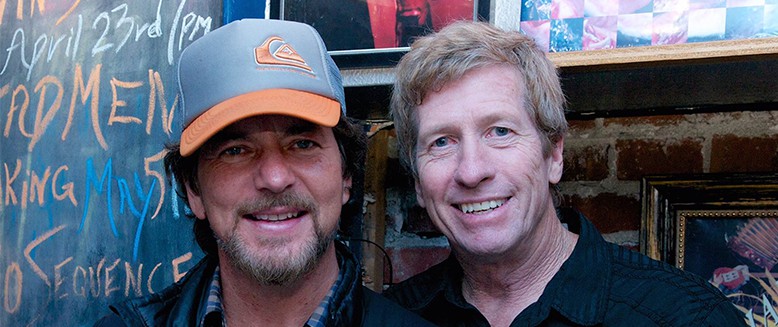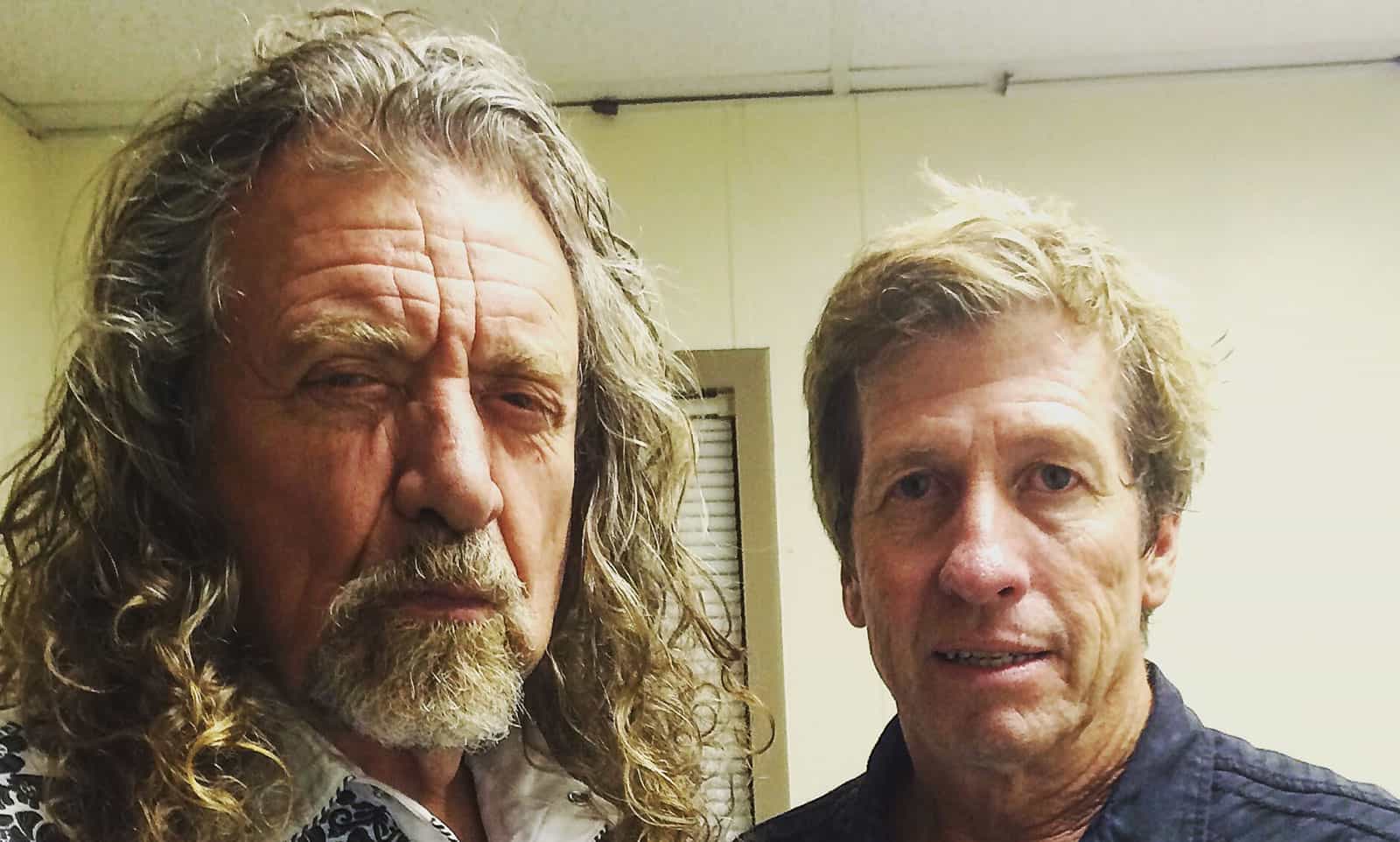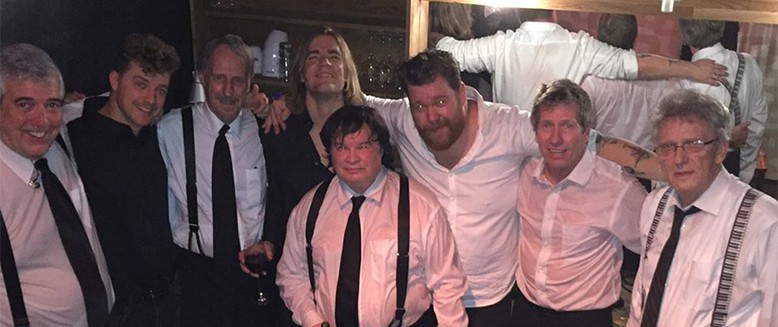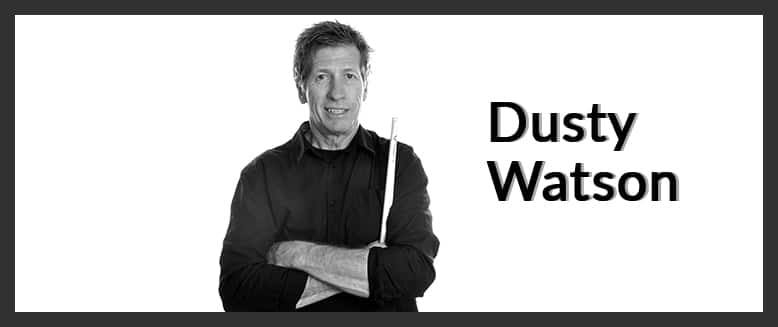My worst nightmare when I came in the rooms was that I couldn’t have fun anymore. When I was sober for a bit, I realized that it’s okay to have fun. Maybe not be crazy, but it’s okay to have fun. OK, yeah I can get crazy too!
For the month of January, we interviewed Dusty Watson, Northbound’s Music Program Director. Dusty has been with Northbound since 2010, following 40 years of working in the music industry.
Dusty has played with several big-name acts such as Lita Ford, Agent Orange, The Safaris, The Sonics and dozens of others. He has even been crowned the King of Surf Drums
during his time as Dick Dale’s drummer.
Dusty has been sober for over 25 years and uses his unique perspective to carry a message of hope through Northbound’s Music Program. He works extensively with clients, focusing on the healing power of music which offers an outlet for young musicians to get help and explore their creativity within a sober environment.
Dusty is currently touring with the Sonics and remains active in the local recovery community.
When did you start playing music?
Well, I was playing before I remember playing. I don’t know, four or five years old, I was already playing drums. My parents said I was always banging on pots and pans with wooden mixing sticks when I was real little, so I was already playing before my first memory.
My mom got me my first real drum set when I was six and I started taking lessons. My drum teacher introduced me to Buddy Rich and Gene Krupa and all these heavy, all-star jazz guys. That’s when I got into jazz music.
I played jazz music all through school, won some scholarships. I got offered a full-ride to San Diego State and walked away from that. I was already dependent on drugs and alcohol and I was already doing my own thing by then.

Dusty alongside Eddie Vedder of Pearl Jam
Who were your influences?
Well, I came up listening to the jazz greats, Louie Bellson, Gene Krupa, and Buddy Rich. They were all big band drummers. All those guys were responsible for bringing the drums up to the front of the stage and the front of the music. They put mics on the kick drum for the first time, and drove music in a different way. Up until that point, drums were always in the background and were never a prominent part of the music.
I looked up to the rock drummers obviously, such as Ginger Baker, John Bonham and Mitch Mitchell. All of those guys were really influential to me.
By the time I was 17, I was already playing professionally.
Did the partying really pick up when your career took off?
I started real early. I was already drinking from my dad’s Jack Daniels bottles and taking pills when I was just a kid, like 11 or 12 years old. Sneaking drinks, my mom’s darvon, stuff laying around the house.
Where it really came on strong was when I was 15, playing in a rock and roll band. I had a ’66 Dodge van that I got before I had a license. I was driving under the influence all the time with all my band gear in it. I was off and running from that point on.
When did you realize you needed to stop?
I originally tried to get sober in 1989. I had been struggling for a few years and kept falling back in. The hardest to quit was dinking. I did a lot of drugs, lot of drugs, but drinking was on the table every day, no matter what. The drugs came and went, you know what I mean?
I did a six year run of crystal meth at the end, every day. That’s what finally took me out, because I was so insane.
I once had a high speed chase on a motorcycle. I was playing with Legs Diamond at the time. We had played at a party in LA and I was on my way back. I don’t really remember. I was in and out of consciousness. There’d been police chasing me for miles and miles and I didn’t know it. They had set up a roadblock ahead.
They had a lane open in the middle, to let traffic through, but there were guys standing there like, Stop!
And I blew by and that woke me up, snapped me out of my blackout. I remember seeing that and I shut the bike down ’cause I thought, Oh God, they want me to stop.
They sent me to DUI classes after that. There was this doctor from Burbank who came and did a talk on the central nervous system and how it’s affected by stimulants.
It really got my attention because I’m a rush junkie, I love to be stimulated, I love endorphin rushes, I love all of that. And I heard him say, Your body has shut down. It’s not producing these endorphins anymore on its own because you have been chemically inducing that for so many years, that your body may never start reproducing these endorphins again.
So I said, Okay, I’m just going to stop for the remainder of these classes.
I had another 10 weeks or whatever it was. I was okay with quitting the drugs but alcohol was the tough one. I had no idea that it would be so rough. And it tore me up.
I’d never stopped drinking ever from when I was a little kid. So the DTs came on hard and I couldn’t even manage anything. It was really bad. I detoxed on my living room floor.
I later hooked up with a bunch of guys who went to meetings all the time. This one time, a friend of mine who I’d played in bands with out of high school came by and took me to a meeting. He introduced me to another guy and said he’s going to be your sponsor.
I didn’t have any say in the matter.
But I had the right guys to teach me how to be sober. They really got my attention. They beat me into submission, as they like to say.
I did 90-in-90 for three years. That was my gig, right? You hear of, Oh, yeah, I’m going to do 90 meetings in 90 days.
I just went to a meeting every day for years. And I hung out with a group of guys that stayed sober, and we hung together. I think the peers are really the critical point in a young man getting sober, I really do, or anybody getting sober.

Dusty alongside Robert Plant, lead singer from Led Zeppelin
What made it stick?
I guess being able to be exactly who I am. I didn’t have to change who I am. I was allowed to still be a drummer, still tour around the world, still have relationships with people, still have fun, still fish, still ride motorcycles, so all of that was me being who I was.
And then the rewards were being able to go around and make amends for what I did. I made amends for about, I don’t know, solid three or four years.
During then, I made amends to my dad. That was amazing. I didn’t like the way he handled himself when I was younger, but I understood it. I was able to make amends to him and forgive him for his actions right at that same moment.
I love the reason why the steps are in the order that they are, I love that, because I would have made a completely different amends to my father, had I not made it to the ninth step.
As a 33-year-old man, I was able to do that, and hug my dad on his front lawn, and both of us stood there crying. It was one of the biggest, monumental moments in my early recovery. I learned he was just doing the best he could with what he knew and now we have a wonderful relationship.
Were you scared about getting sober ruining your creativity, not being able to play? I know that’s typically a big concern for young musicians.
It’s probably what kept me using. In order to perform, I don’t just play the beat. I like being an integral part of the visual too in the bands I play in, and I’m yelling and jumping up and down and throwing stuff around. I love it. I used to wonder how I can still be crazy, right.
How am I crazy if I’m not crazy? I think that’s the biggest concern for all musicians.
My worst nightmare when I came in the rooms was that I couldn’t have fun anymore. When I was sober for a bit, I realized that it’s okay to have fun. Maybe not be crazy, but it’s okay to have fun. OK, yeah I can get crazy too!

Dusty with his most recent venture, the Sonics in Stockholm, Sweden.
What’s one of your fondest memories from playing?
I was with the Surfaris, and we did a radio thing at BB King’s club at Universal Studios and during the set we played Wipe Out. When we finished the song, there was a standing ovation that seemed to last several minutes. I have no idea how long it lasted.
I had a lot of friends there, radio personalities, the mayor, all these people were there, and it was freakin’ unbelievable. It was such a great moment for me.
There’ve been a lot of them, but that one was really good because Wipe Out, for a young drummer like me, when I was coming up, well that was the song!
How did you start working in treatment?
Good question. So I’m touring… I’m gone about six to eight months a year, playing in multiple bands, on the road all the time. I fall in love with a girl in Denver. She moves out to California. We get married. We have a house. We build a white picket fence and la la la.
I’m gone all the time and thought to myself, This is crazy. I love this girl.
I knew I had to do something. I had to get a local job. I didn’t want to be out on the road so much.
And I’m like, I don’t know what I can do.
The only other thing that I have passion for besides drumming is recovery, so I talked to a few of my buddies about getting my CADAC certificate. I found out that I could work and get paid while I’m getting it.
I started working at a treatment center in Upland while I was going to school and then I found out about Northbound through a friend of mine that was working here, so I came over. I talked to Mike Neatherton and we hit it off right away. I started as a case manager. I did that for several years then worked as the director of our IOP program and eventually was given the opportunity to start our Music Program.
Have any of the clients recognized you?
There was this one time that was really funny. I was running a large group of guys and we finished a few minutes early. They loved it when I’d tell them stories from playing. It was like Dusty’s campfire stories or whatever, because all these guys loved to hear rock and roll stories.
So I’m telling them a story, and this guy jumps up out of his seat and goes, Oh, my God, you’re Dusty Watson! I saw you punch Nikki Sixx in the face at the Troubadour. I was there!
And he’s like jumping up and down, literally left his feet.
But yeah, there’ve been a few clients that recognize me, but mostly it’s the punk rock bands I’ve played with that they are familiar with, not me personally.
If you could tell anything to the newcomer, what would it be?
I really believe it’s like you have to commit to your recovery on a level that you probably have never imagined before, because it’s so easy for you to pick up again.
There’s going to be times when you have that opportunity placed in front of you, and you won’t be prepared for it. You won’t be expecting it. You need to know that this is more important than all of that. Your recovery has to come first before anything and that’s a tough one. That’s what I would suggest. Remember, No Matter What
.
About Northbound’s Music Program
The Northbound Music Program involves a combination of listening to, composing and discussing music during treatment. Clients explore how music and recovery intertwine and have the opportunity to create and share original recordings. This program is especially helpful for struggling musicians to explore their creativity in a sober environment that’s conducive to recovery.
This program works in conjunction with 12 step support and other traditional forms of therapy to help clients build healthy relationships and develop the coping skills necessary to enjoy a sustainable recovery after treatment.
Author
-

President, CEO & Founder at Northbound Treatment Network
Paul Alexander is the CEO, President & Founder of Northbound Treatment Network in Newport Beach, California. He believes wholeheartedly in transformational leadership, organizational health and effective, fully integrated substance use disorder and mental health treatment. With over 27 years of experience in behavioral healthcare, Paul has extensive knowledge of “in vivo” treatment modalities, clinical development, operations, strategy, marketing and financial planning. He has been widely recognized for his development of collegiate-based residential treatment programs for students in recovery and authored a research study at The University of California confirming this modality’s effectiveness.
Paul’s comprehensive professional experience, willingness to innovate, and emphasis on organizational health are vital factors in Northbound’s continued success. Paul received his Certified Addiction Treatment Specialist training at Saddleback College in Mission Viejo, CA, and was awarded Outstanding Alumni Service Award in 2002. Paul holds a Bachelor of Arts degree in Criminology, Law and Society, Summa Cum Laude, from University of California, Irvine, and a Juris Doctorate degree from Loyola Law School of Los Angeles. Paul currently serves on The National Association of Addiction Treatment Providers (NAATP) board. In addition, he serves on The Family Recovery Foundation board and The CarePossible board in Orange County; both organizations are committed to raising funds for family recovery and treatment for former military personnel. Paul is in recovery himself and lives in Orange County with his wife Silvana and his two young sons, Noah and Dean.










